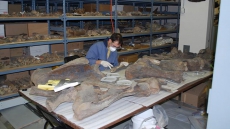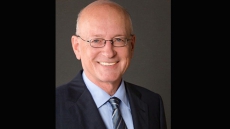OTTAWA — After 18 months on the job, Bank of Canada governor Stephen Poloz has yet to wield the primary tool at his disposal: the key interest rate.
When Poloz took the bank's reins in June 2013, he inherited an overnight rate set nearly three years earlier by his predecessor Mark Carney. That rate has yet to budge from one per cent, idling for one of the longest stretches in Bank of Canada history.
With Canada's economy showing signs of recovery, could 2015 be the year Poloz starts hiking up the central bank's trend-setting rate and, if so, when?
"I don't know how itchy his fingers are to start moving that dial," said Bill Robson, the president of the C.D. Howe Institute think-tank.
Robson, however, believes it will happen sometime in 2015 thanks to an increasingly positive economic outlook, including an improving U.S. economy and a pickup in Canadian exports.
Once the bank's overnight rate starts to creep up, Canadian businesses will see their borrowing rates rise as will consumers who take out car loans and mortgages.
Ian Lee, a professor at the Sprott School of Business at Ottawa's Carleton University, predicts businesses will feel the sting of higher rates right away, but he expects the effect on households to be much more muted.
Many consumers, he added, will avoid a sudden jolt because of fixed-rate loans and mortgages.
On top of that, Lee said the rate would likely inch up a quarter-percentage point at a time, making the coming increases easier to manage than the towering Canadian levels of the early 1980s.
Lee, a mortgage manager at the time, recalled how rates soared to 20 per cent in 1981.
"When I hear people ... getting all excited saying, 'Gee whiz, rates might go up to three or four or five per cent' — I mean, I almost laugh," Lee said.
"And not because I'm saying it's trivial, but what I mean is: the Canadian economy and the Canadian people experienced far more savage interest rates."
Lee said the rate hikes in the early 80s killed the real-estate market, but didn't create a housing meltdown and the number of foreclosures barely increased.
On the flip side, higher rates would help pension funds reap a bigger return on their investments, Lee added.
McGill University economics professor Christopher Ragan said, fundamentally, rising rates are a good thing.
"It is signalling a stronger economy," he said.
The Bank of Canada said last week the country had showed signs of a "broadening recovery" and the output gap appeared to be smaller than it had projected just six weeks earlier. The output gap represents the divide between where the economy stands at a given time and where it would be when performing at its full potential.
However, the bank's statement offset the positives by pointing to potential threats: weakening oil prices that drive down inflation and the significant risks of high household debt accumulated during years of low borrowing rates.
The basic logic behind low rates is to encourage people to gather debt when the economy is weak, said Ragan, who has worked at the Bank of Canada.
He added, however, that monetary policy is a "pretty blunt instrument" that can't control those who borrow too much.
"Some people have too much debt, but not everybody," Ragan said.
"Some firms probably have too much debt, but not all firms. And monetary policy just can't address that issue."
A report released last week by Equifax Canada, a credit rating agency, crunched numbers on Canada's growing mountain of consumer debt.
It found the collective debt of Canadians was more than $1.5 trillion — up 7.4 per cent from a year ago. Excluding mortgages, Equifax said Canadians owed an average of $20,891.
Figures like these raise questions about how much even a slight rate increase would affect Canadians who have gorged on cheap credit.
Robson said while the scale of the debt load is "quite alarming," he doesn't anticipate any major rate increases in the near future. He expects the bank to nudge the rate to 1.25 per cent and then, perhaps, to 1.5 per cent six months later.
"It's interesting after all this time, how our thinking about interest rates has been shaped by this very, very long environment of low interest rates that even an overnight rate of 1.5 per cent could look like a big deal," he said.
The Bank of Canada hasn't moved the key interest since September 2010, and by early January, the current pause will become the third longest in its 80-year history.
A spokeswoman for the bank said the longest rates have ever been frozen was almost nine years — between March 1935 and February 1944 - at 2.5 per cent.
The timing of the next rate change remains a source of debate among experts.
Robson belongs to the camp that expects Canada's strengthening economy to force Poloz to move the rate in the middle of 2015, while Lee predicts the rapidly shrinking output gap will spur an increase as early as this spring.
The Organization for Economic Co-operation and Development recently predicted the Bank of Canada would start pushing the rate up in late May due to advancing inflation, a key driver of interest rates.
At the other end of the spectrum, economists like David Madani of Capital Economics expect Poloz to stand pat for a while, even after the U.S. Federal Reserve starts hiking its own key rate.
He predicts the forces pushing Canadian inflation upwards to remain fairly subdued in 2015, which he says will keep the central bank in a "holding pattern" for the whole year.
Robson said it would even be OK if Poloz raised rates and then edged them back down, if necessary.
"Everybody knows that the central bank has trouble reading the economy just as everyone else does," he said.





